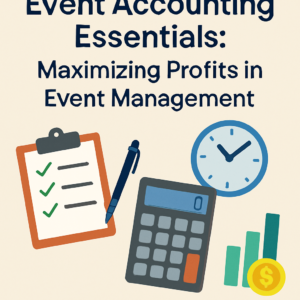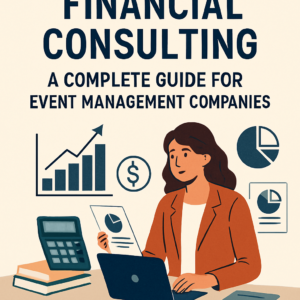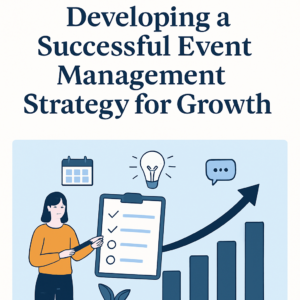Mastering Event Accounting: A Guide for Event Professionals
Hey there, event industry trailblazers! If you’ve ever found yourself knee-deep in receipts while trying to figure out whether last month’s gala was a financial triumph or a budgetary nightmare, you’re not alone. Welcome to the colorful world of event accounting, where spreadsheets and creativity meet, and where your financial management can make or break your event planning business.
With the U.S. event planning industry anticipated to grow by a staggering 18% from 2020 to 2030, mastering the art of event accounting is more crucial than ever. Whether you’re booking venues, managing vendors, or tracking expenses, having a solid grip on your finances will help you navigate this dynamic landscape with ease.
If you’ve ever wished for a magical formula to simplify accounting for events, you’re in for a treat. Imagine being able to juggle budgeting for events and event expense tracking without breaking a sweat! Let’s dive into the essentials of event financial management, where we’ll uncover tips and tricks to streamline your workflow and ensure every dollar is accounted for—so you can focus on what you do best: creating memorable experiences.
Understanding Event Financial Management
When it comes to event financial management, think of yourself as a captain navigating through uncharted waters. You have your crew (a.k.a. your team), the ship (your event), and the treasure map (your budget). If you don’t pay attention to the coordinates, you might end up stranded on an island far from your goals!
At its core, event financial management is about keeping your finances in shipshape so you can weather any storm. Here are some key components to consider:
- Budgeting for Events: Start with a well-structured budget that considers every detail—from venue rental to catering and décor. A detailed budget not only sets clear expectations but also serves as your financial compass throughout the planning process.
- Expense Tracking: Keep a close eye on spending by categorizing expenses and using software tools for effective event expense tracking. This will help you spot any discrepancies early on and adjust accordingly.
- Financial Reporting: After each event, prepare a comprehensive financial report detailing income, expenses, and overall profitability. This isn’t just for accountability; it’s also valuable data for making informed decisions in future events.
- Cash Flow Management: Just like a good coffee, cash flow needs to be strong! Ensure you have enough liquidity to cover unexpected expenses or delays in payments from clients. Regularly forecasting cash flow will keep your operations smooth.
- Audit Preparedness: Let’s face it—nobody loves audits, but being prepared can take away some of that anxiety. Maintain organized records and ensure compliance with all necessary regulations. Think of it as tidying up before company arrives!
The global event management software market is booming, valued at USD 6.36 billion in 2020 with an expected growth rate of 11.2% through 2028 (source). This growth underscores how crucial it is for event professionals to embrace tech tools that enhance their accounting in event planning.
If you find yourself overwhelmed, know that you’re not alone! Many in our industry struggle with financial management, which is why understanding these principles can set you apart from the competition.
“Good financial management is not just about tracking numbers; it’s about telling a story.”
This story is yours—filled with opportunities and potential pitfalls. By mastering the art of event accounting, you’ll be better equipped to transform every challenge into success!
The Importance of Budgeting for Events
Alright, let’s talk about the elephant in the room: budgeting for events. You might think, “Can’t I just wing it?” But trust me, that’s like trying to bake a cake without a recipe—sure, it might turn out okay, but there’s a good chance you’ll end up with a soggy disaster instead of a scrumptious masterpiece.
Budgeting is the backbone of your event planning process. It’s not just about keeping costs down; it’s about setting yourself up for success and ensuring your clients walk away happy. Here are some key reasons why budgeting is essential:
- Clarity and Direction: A well-structured budget provides clarity on where your money is going. It sets expectations and aligns your team to work towards common financial goals. Just like a roadmap, it keeps everyone on track and minimizes confusion.
- Cost Control: Having a detailed budget allows for better cost management for events. You’ll be able to see which areas you may be overspending in and make adjustments before they become costly mistakes.
- Decision Making: With a solid budget in hand, you can make informed choices. Whether it’s choosing between two venues or deciding on catering options, knowing your financial boundaries helps you prioritize what truly matters.
- Client Trust: Clients appreciate transparency! When you present them with an organized event budget, it shows that you’re professional and reliable. This builds trust and can lead to repeat business—who wouldn’t want that?
- Avoiding Stress: Let’s be honest—managing an event can be stressful enough without worrying about finances spiraling out of control. A clear budget helps alleviate this stress by keeping your expenses in check from start to finish.
And remember, budgeting isn’t a one-time task! It’s an ongoing process that requires regular updates as you get new information or as circumstances change. Think of it like checking the weather before heading out—you want to make sure you’re prepared for any surprises!
“A budget is telling your money where to go instead of wondering where it went.”
This quote sums it all up perfectly! By mastering the art of financial planning for events, you’ll have full control over your spending and ensure every dollar contributes to creating unforgettable experiences.
If you haven’t already implemented budgeting tools into your workflow, now’s the time! Embrace tech solutions that streamline budgeting processes so you can focus more on crafting those magical moments we all love in our industry.
The bottom line? Strong event accounting practices lead directly to successful events and happy clients. So let’s keep those budgets tight and our goals big!
Accounting for Events: Best Practices
Let’s get real for a second—accounting for events can sometimes feel like trying to solve a Rubik’s Cube blindfolded. But fear not! With the right strategies, keeping your financials in check can be as smooth as a well-rehearsed dance routine.
1. Start with Clear Goals
Before you dive into the nitty-gritty of event financial management, take a moment to set clear objectives. Ask yourself:
- What are my revenue targets?
- How much am I willing to spend?
- What kind of return on investment (ROI) do I expect?
Having these questions answered will guide your financial decisions and help you craft a budget that aligns with your overall aspirations.
2. Invest in Technology
A wise man once said, “Work smarter, not harder!” Embrace accounting software that simplifies your life. Whether it’s invoicing for event planners or tracking expenses, using technology can streamline tedious tasks and give you more time to focus on creativity. Plus, many platforms offer features specifically designed for bookkeeping for events, making your job easier.
3. Keep Detailed Records
No one enjoys digging through piles of receipts like it’s an archaeological dig, but trust me—keeping detailed records is worth the effort! Make it a habit to document every expense and income source related to your events. Not only does this improve your event expense tracking, but it also prepares you for any audits that might come knocking at your door.
4. Regular Financial Reviews
Your finances aren’t something you can check once and forget about! Regularly review your income statements, balance sheets, and cash flow reports. This will help you stay on top of trends and make necessary adjustments on the fly.
“An ounce of prevention is worth a pound of cure.”
This old saying rings especially true in event accounting! By staying proactive, you’ll catch potential issues before they become big headaches.
5. Collaborate with Professionals
If numbers make your head spin faster than a disco ball, consider teaming up with an accounting professional who understands the unique challenges of financial reporting for events. They can provide insights into cost allocation in event projects and help you optimize your profitability without all the stress!
6. Review Post-Event Financials
Your work doesn’t end when the last guest leaves; it’s time for an after-party review! Analyze the event profit and loss statement, measure what worked well, and identify areas for improvement in future events. This will keep you informed and ready to tackle new challenges head-on!
The world of event accounting may seem daunting at times, but by implementing these best practices, you’ll be setting yourself up for long-term success. Remember: it’s all about creating memorable experiences—and ensuring those experiences are financially sound makes them even sweeter!
If you’re interested in diving deeper into effective strategies for managing finances in our industry, check out our article on Key Principles for Effective Event Management Accounting. Your future self will thank you!
Cost Management and Control in Event Planning
Now, let’s roll up our sleeves and tackle cost management and control in event planning—because let’s be honest, nobody wants to be that planner who goes over budget and leaves clients wondering what happened to their hard-earned cash!
Cost management is like playing a game of chess, where every move counts. It requires careful strategy and foresight to ensure all pieces fall into place without spiraling into chaos. Here are some practical tips to help you take control of your event costs:
1. Set Realistic Budgets
First things first: when planning an event, set a budget that’s not just wishful thinking but rooted in reality. Take into account all potential expenses, including venue costs, catering, marketing, and even those little things that can add up quickly (hello, last-minute décor!). A well-crafted budget acts as your financial GPS—it guides you through the planning process without leading you astray.
2. Break Down Costs into Categories
To keep your finances organized, break down costs into specific categories. Whether it’s venue rental, catering services, or entertainment fees—this granular approach not only makes tracking easier but also helps identify areas where you might save some bucks.
- Venue Costs: Think about space rental and any necessary permits.
- Catering: Include food & beverage options but don’t forget about service charges!
- Marketing: Allocate funds for promotional materials and advertising efforts.
- Production: Account for AV equipment, lighting design, and décor essentials.
Navigating costs this way allows you to keep your finger on the pulse of spending while enabling adjustments when necessary—like switching from fancy hors d’oeuvres to something delicious yet budget-friendly!
3. Evaluate Vendor Contracts Carefully
Your vendor agreements can make or break your budget! Take time to read every clause (yes, even the fine print). Seek out providers who offer flexibility in their pricing structures—maybe they can throw in a discount for early payment or offer value-added services at no extra cost! It never hurts to ask; after all, negotiation is part of the game!
“The best negotiators aren’t those who always win; they’re the ones who create value for everyone involved.”
4. Monitor Expenses in Real-Time
A great way to maintain cost control during an event is by keeping an eye on expenses in real-time. Use budgeting software or apps designed specifically for event expense tracking. This proactive approach allows you to see where overspending may occur before it becomes a disaster resembling a runaway train!
5. Be Prepared for Unexpected Costs
No matter how meticulously you plan, unexpected expenses will pop up like uninvited guests at a dinner party! To manage these surprises effectively:
- Create a Contingency Fund: Set aside around 10-15% of your total budget as a cushion for unforeseen circumstances.
- Prioritize Flexibility: When negotiating with vendors or finalizing contracts, aim for terms that allow some leeway should unexpected costs arise.
- Avoid Last-Minute Decisions: Planning ahead means fewer surprises! Stick to your timeline so there are no panic-driven expenses down the road.
Your ability to manage costs effectively can lead not only to successful events but also happy clients eager to work with you again! Remember: it’s not just about saving money; it’s about creating value in every aspect of your event while staying financially sound.
“Managing costs isn’t just about cutting corners; it’s about maximizing impact with every dollar spent.”
If you’re looking for deeper insights into how strategic financial planning can enhance your event management efforts while ensuring profitability, be sure to check out our article on Building a Profitable Corporate Event Management Company: Financial Framework. Your future self will thank you as much as your clients will!
Event Profit and Loss Statement: An Overview
Let’s get straight to the point: the event profit and loss statement is your best friend when it comes to understanding the financial health of your event. Think of it as the scoreboard in a game; it tells you who’s winning, who’s losing, and just how far off your targets you might be.
So, what exactly goes into this all-important document? Here’s a simple breakdown:
- Revenue: This includes all the money coming in from ticket sales, sponsorships, merchandise, and any other income-generating sources. It’s crucial to track every dollar—after all, there’s no such thing as too much info when it comes to knowing how well your event is doing!
- Expenses: Here’s where things can get a little hairy. This section should include every cost associated with putting on your event: venue rental, catering, entertainment, marketing expenses—the works! The key is to be detailed so you fully understand where your money is going.
- Net Profit or Loss: This bottom line tells you if you made money (woohoo!) or if you need to rethink your strategy (yikes!). It’s calculated by subtracting total expenses from total revenue. A positive number means you’re in the green; a negative number? Well, let’s just say it might be time for some soul-searching about that last gala.
The Importance of Regular Reviews
Your job doesn’t stop once the event wraps up. Regularly reviewing this statement will help you identify patterns over time. For example:
- Were there particular events that consistently brought in more revenue?
- Did certain expenses always run over budget?
- Is there a trend in sponsorships that could guide future partnerships?
This analysis is invaluable for refining your approach to future events. Make adjustments like a chef perfecting their famous dish—add more spice here, cut back on salt there!
“A great event isn’t just about how many people show up; it’s also about how much money stays in your pocket.”
If you’re not already implementing an event profit and loss statement, now’s the time! It streamlines your financial planning and provides clarity on how each event contributes to your overall business goals.
Your clients will appreciate seeing clear outcomes from their investments too—it builds trust and confidence in your abilities as an event planner. Plus, knowing where you stand financially means fewer surprise bill moments when it’s time to settle up!
The bottom line? Embrace the power of your event profit and loss statement! Not only does it keep you accountable; it also empowers you with insights that can propel your business toward greater profitability and success.
Navigating Financial Compliance in the Event Industry
Navigating the financial compliance landscape in the event industry can feel like piloting a ship through a storm—there are regulations and standards to consider, and one misstep could leave you adrift. But fear not, fellow event professionals! Understanding compliance is essential to ensure your events run smoothly and that your business remains in good standing.
First off, let’s talk about why compliance matters. Non-compliance can lead to fines, legal troubles, and even damage to your reputation. Plus, it’s not just about keeping the authorities happy; being compliant builds trust with clients and stakeholders who want peace of mind knowing their investments are safeguarded.
Key Areas of Financial Compliance
Here are some crucial areas you should keep an eye on:
- Tax Compliance: Depending on your location and the nature of your events, there may be various tax implications to consider—from sales tax on tickets to payroll taxes for staff. Be sure to stay informed about local tax laws and ensure you’re filing correctly. It might also be wise to consult with a tax professional who understands the intricacies of event accounting.
- Insurance Requirements: Many venues require proof of insurance before they’ll allow your event to take place. This means getting proper coverage for liability, workers’ compensation, and any other relevant policies. Remember: it’s better to have it and not need it than need it and not have it!
- Vendor Contracts: Make sure all agreements with vendors are documented clearly. This helps protect both parties should there be any disputes later on—and can save you from headaches down the line.
- Licensing Compliance: If you’re planning an event that involves music or entertainment, check whether you need special licenses or permits for performances or screenings. Obtaining these ahead of time ensures you won’t face last-minute roadblocks.
- Financial Reporting Standards: Maintaining accurate financial records is vital for compliance purposes. Regular audits can help verify your practices are in line with industry standards—think of it as a health check for your finances!
The Benefits of Staying Compliant
You might wonder: “What’s in it for me?” Well, staying compliant has several benefits:
- Avoidance of Fines: Compliance helps steer clear of costly penalties that could impact your bottom line.
- Enhanced Reputation: A company known for its integrity attracts clients who value transparency—building long-term relationships based on trust.
- Smoother Operations: When you adhere to regulations, everything runs more efficiently—from budgeting to vendor management—allowing you more time to focus on the creative aspects!
“In the world of events, compliance isn’t just another box to tick; it’s part of creating a trustworthy brand.”
If you’re feeling overwhelmed by financial compliance complexities, remember that you don’t have to go it alone! Hiring specialized event accounting services, or consulting with professionals who understand the nuances can make navigating these waters much easier.
The bottom line? Keeping up with financial compliance isn’t just about following rules; it’s about setting yourself up for success while paving the way for unforgettable events that leave lasting impressions. So grab that compass (or calculator!) and sail confidently into compliant waters!
Sponsorship Accounting in Events
Ah, sponsorship accounting in events—where the magic of collaboration meets the reality of financial management. Picture this: you’ve secured a couple of amazing sponsors for your upcoming gala. They’re excited to partner with you, but once those dollars start flowing in, how do you keep track of everything without losing your mind (or your revenue)?
First things first, let’s get clear on what sponsorship accounting entails. It’s all about managing and documenting the financial aspects related to sponsorship deals. From tracking incoming funds to ensuring sponsors receive their promised benefits, getting it right is essential for maintaining good relationships and staying afloat financially.
The Importance of Sponsorship Accounting
Why does this matter? Well, for starters:
- Clarity: Keeping accurate records allows you to clearly see how much each sponsor is contributing. It also helps in understanding which sponsorships are most lucrative and worth pursuing again in the future.
- Trust Building: Delivering on sponsorship agreements builds trust with your partners. When sponsors see that you’re effectively managing their contributions and providing them with agreed-upon benefits—like signage at the event or mentions in promotional materials—they’re more likely to continue supporting your future endeavors.
- Financial Insight: Good sponsorship tracking can provide valuable insights into overall event profitability. Knowing which sponsors brought in the most revenue or which events had higher sponsorship engagement can enhance your decision-making for future events.
Sponsorship Tracking Strategies
So how do you manage this delicate dance? Here are some practical tips:
- Create a Sponsorship Agreement Template: Having a clear contract outlining deliverables, payment schedules, and expectations sets everyone up for success. This template should include payment timelines for when you expect to receive funds—so there are no surprise “where’s my money?” moments!
- Use Technology: Invest in accounting software that allows you to track sponsorship revenue efficiently. Many platforms offer features tailored specifically for event professionals, making it easier than ever to manage financial data without drowning in spreadsheets.
- Regular Communication: Keep lines of communication open with your sponsors throughout the planning process! Regular updates on how their contributions are being utilized fosters a sense of partnership and transparency.
- Document Everything: Track every penny! From initial payments to any additional perks provided (like free tickets or exclusive meet-and-greets), having detailed documentation will protect you if questions arise later on.
“Sponsorship is not just about handing over money; it’s about building lasting partnerships.”
The Financial Benefits
A well-managed sponsorship program can significantly impact your bottom line! Consider this:
- Sponsors often bring added value beyond just monetary contributions—think promotional support or access to their networks.
- The more efficient your accounting processes are, the less time you’ll spend worrying about finances and more time focusing on creating unforgettable experiences for attendees!
The bottom line? Effectively managing sponsorship accounting can turn potential chaos into seamless cooperation—and who wouldn’t want that? By implementing solid tracking methods, you’ll ensure that both you and your sponsors reap the rewards while fostering long-lasting relationships built on trust and transparency.
If you’re eager to learn more about optimizing every dollar spent through strategic partnerships, consider checking out our guide on Pricing Event Solutions: A Guide to Profitable Service Structures. After all, every successful event deserves financial finesse!
Cashing In: Revenue Management Strategies for Events
Let’s talk about cash, baby! When it comes to managing an event, the last thing you want is to find out that the money coming in doesn’t match up with the money going out. That’s where savvy revenue management strategies come into play. Think of these strategies as your financial GPS, guiding you through the winding roads of event planning to ensure you reach your destination without running out of gas!
1. Establish Diverse Revenue Streams
Relying on a single source of income can be risky, especially in the unpredictable world of events. By diversifying your revenue streams, you can cushion yourself against unforeseen hiccups:
- Ticket Sales: This is usually your primary revenue source. Be creative! Consider tiered pricing or early-bird discounts to entice attendees.
- Sponsorships: Secure partnerships with brands that align with your event’s mission. Offering them visibility during the event creates a win-win scenario—more exposure for them and more funds for you!
- Merchandise Sales: Selling branded merchandise or event-related products can provide a nice boost to your bottom line.
- Food and Beverage Sales: If applicable, hosting food vendors can yield additional income while satisfying hungry guests.
2. Implement Dynamic Pricing Models
Just like airline tickets, prices for events can fluctuate based on demand. Consider implementing dynamic pricing models, where ticket prices increase as the event date approaches or as seating becomes limited. This tactic encourages early purchases and maximizes revenue potential!
3. Monitor Your Financial Health Regularly
You wouldn’t drive cross-country without checking your fuel gauge, right? Similarly, regularly monitoring your financial health is essential for effective revenue management:
- Weekly Reviews: Set aside time each week to review income statements and cash flow reports. Keeping an eye on these metrics helps identify trends—like if certain ticket tiers are selling faster than others.
- Adjust Budgets Accordingly: If you notice a particular area generating more revenue than expected (go team!), allocate those funds strategically elsewhere.
“The best way to predict the future is to create it.”
This quote rings especially true in revenue management! By being proactive and making informed decisions based on real-time data, you’ll pave the way for successful events ahead.
4. Optimize Marketing Strategies
Your marketing efforts play a critical role in driving revenue! Utilize social media campaigns tailored around ticket sales or special promotions to attract potential attendees:
- Email Campaigns: Use targeted email lists to reach past attendees with special offers or early access tickets.
- Sponsorship Promotion: Highlight sponsors across platforms; this not only attracts attendees but showcases the value they get from partnering with you.
5. Post-Event Analysis
The party may be over, but that doesn’t mean it’s time to rest just yet! Conducting a detailed analysis post-event allows you to assess how well your revenue strategies worked:
- Your Profit Margins: Did they meet expectations? If not, dig into what went wrong—was it overspending in certain areas?
- Sponsor Satisfaction: Reach out for feedback on their experience; happy sponsors are likely to return for future collaborations!
This isn’t just about crunching numbers; it’s about using insights gained from past performances to improve future outcomes!
Cashing in on effective revenue management strategies doesn’t have to feel like an uphill battle! With careful planning and regular assessments, you’ll be well-equipped to keep those financial wheels turning smoothly while creating spectacular events that leave everyone raving long after the last guest leaves.
If you’re looking for more tips on maximizing profitability while crafting unforgettable experiences, consider checking out our guide on strategic financial planning in events—it’ll help ensure every dollar counts toward success!
Conclusion: Your Pathway to Financial Mastery in Events
As we wrap up our journey through the intricate world of event accounting, it’s clear that mastering your financials is not just a nice-to-have; it’s an essential cornerstone for success in the event management industry. Think of it as the secret sauce that turns your carefully planned events into resounding triumphs, ensuring that both you and your clients walk away smiling.
Let’s be honest: navigating the complexities of event financial management can sometimes feel like trying to solve a Rubik’s Cube—frustratingly colorful, but immensely rewarding once you figure it out! You’ve learned how to set up realistic budgets, track expenses diligently, and analyze profits and losses with confidence. Now, it’s time to put all that knowledge into action!
“Financial mastery in events isn’t just about numbers; it’s about crafting unforgettable experiences that are also financially sound.”
Your path to financial mastery starts with embracing tools and practices that streamline your processes. Whether it’s refining event expense tracking, enhancing your budgeting strategies, or getting comfortable with financial reporting for events, every step you take builds towards a more organized and profitable future.
- Stay Curious: The event industry is ever-evolving. Stay informed about trends in cost management for events and be open to adopting innovative software solutions that can ease your workload.
- Build Relationships: Don’t underestimate the power of networking! Connecting with fellow event professionals can provide insights into effective strategies they’ve implemented successfully.
- Cultivate a Growth Mindset: Mistakes will happen; embrace them as learning opportunities rather than setbacks. Each event provides valuable lessons that contribute to your growth as a professional.
Remember, your clients trust you to deliver not just an experience but results—and a well-managed budget is key to exceeding their expectations. With solid financial practices in place, you’ll have more freedom to unleash your creativity and make magic happen at every turn!
The bottom line? Financial mastery in event planning is not just about keeping the books balanced—it’s about setting yourself up for success while delighting clients with exceptional outcomes. So go ahead, grab those spreadsheets, update those budgets, and prepare to dazzle everyone at your next event!









